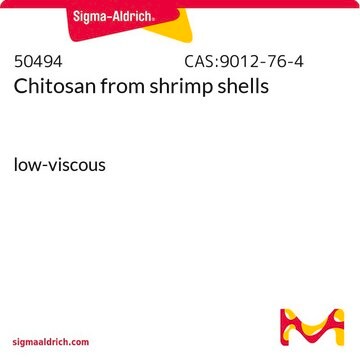419419
Chitosan
high molecular weight
Synonym(s):
Deacetylated chitin, Poly(D-glucosamine)
About This Item
Recommended Products
form
(Coarse ground flakes and powder)
mol wt
310000-375000 Da
viscosity
800-2000 cP, 1 wt. % in 1% acetic acid(25 °C, Brookfield)(lit.)
solubility
H2O: insoluble
organic solvents: insoluble
InChI
1S/C56H103N9O39/c1-87-56(86)65-28-38(84)46(19(10-74)96-55(28)104-45-18(9-73)95-49(27(64)37(45)83)97-39-12(3-67)88-47(85)20(57)31(39)77)103-54-26(63)36(82)44(17(8-72)94-54)102-53-25(62)35(81)43(16(7-71)93-53)101-52-24(61)34(80)42(15(6-70)92-52)100-51-23(60)33(79)41(14(5-69)91-51)99-50-22(59)32(78)40(13(4-68)90-50)98-48-21(58)30(76)29(75)11(2-66)89-48/h11-55,66-85H,2-10,57-64H2,1H3,(H,65,86)/t11-,12-,13-,14-,15-,16-,17-,18-,19-,20-,21-,22-,23-,24-,25-,26-,27-,28-,29-,30-,31-,32-,33-,34-,35-,36-,37-,38-,39-,40-,41-,42-,43-,44-,45-,46-,47-,48+,49+,50+,51+,52+,53+,54+,55+/m1/s1
InChI key
FLASNYPZGWUPSU-SICDJOISSA-N
Looking for similar products? Visit Product Comparison Guide
Related Categories
Application
Features and Benefits
Physical form
Storage Class Code
11 - Combustible Solids
WGK
nwg
Flash Point(F)
Not applicable
Flash Point(C)
Not applicable
Personal Protective Equipment
Certificates of Analysis (COA)
Search for Certificates of Analysis (COA) by entering the products Lot/Batch Number. Lot and Batch Numbers can be found on a product’s label following the words ‘Lot’ or ‘Batch’.
Already Own This Product?
Find documentation for the products that you have recently purchased in the Document Library.
Articles
Carcinogenic compounds in elastomers: 1,3-butadiene and isoprene used in elastomer manufacturing, classified as carcinogenic by IARC.
Carcinogenic compounds in elastomers: 1,3-butadiene and isoprene used in elastomer manufacturing, classified as carcinogenic by IARC.
Polymers, natural or synthetic, are vital in medical advancements, contributing to device and pharmaceutical development in therapy.
Polymers, natural or synthetic, are vital in medical advancements, contributing to device and pharmaceutical development in therapy.
Our team of scientists has experience in all areas of research including Life Science, Material Science, Chemical Synthesis, Chromatography, Analytical and many others.
Contact Technical Service





